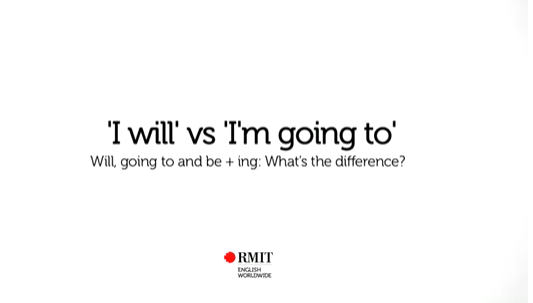Hi in this tip, I'm going to show you the difference between these three forms for expressing the future. Firstly, did you notice that I said, I'm going to?
This is because going to, is used to express intentions or decisions that have already been made. Going to, can also be used to talk about things that are about to happen, or that will happen very soon as in the following, I'm going to the shops now, do you want me to get you anything?
Going to can also be used to predict the future based on present evidence, for example, in the statements, look at those dark clouds it's going to rain. To sum up, going to, is used for intentions, the decision's already made, things about to happen and predictions based on present evidence. The future form be plus ing is also known as present continuous with future meaning. It is used similarly to going to, and that we also use it to talk about events in the future that are already decided, or that we intend to do.
However, it is different in that we use be plus ing forms specifically to talk about arrangements or plans we've made with someone else. So in talking about future arrangements with say, I'm having dinner with Martin on Thursday, more than I'm going to have dinner with Martin on Thursday. That's the special use of be plus ing.
The last form is will plus a base form verb, because the word will seems to express a strong will or intention to do something, English learners tend to misuse it for the uses I just talked about before. Actually will, is used for decisions made at the moment of speaking and predictions about the future, for which we may not have any present evidence. For decisions made at the moment of speaking, they could be when ordering food in a restaurant, I'll have the pasta please, or they could also be offers of help. I'll make you a cup of tea. Promises, I'll marry you Sarah, or threats, I'll kill him the next time he does that.
For predictions about the future, unlike going to you don't have present evidence or the future could be a long way off. For example, in 50 years time, all people will drive hydrogen cars. To sum up will is used for decisions made at the moment of speaking, predictions for the future, without evidence or predictions for the future that is a long way off.




